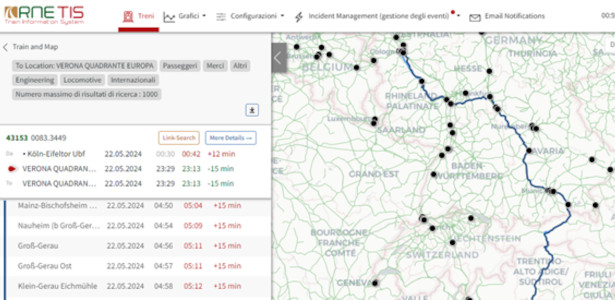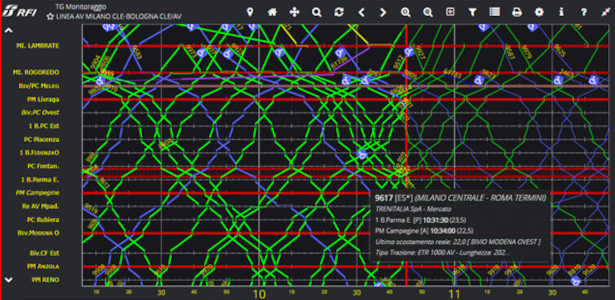RFI Rete Ferroviaria Italiana is a key player in the implementation of the Single European Railway Area (SERA), and in facing the challenges of an ever-changing sector in Europe.
With its active participation in the RailNetEurope (RNE) working groups, oriented towards the development of IT systems for increasing the accessibility, quality and efficiency of the railway network throughout Europe, RFI aims to optimise traffic circulation and monitoring of international trains on the Italian national railway network.
To this end, RFI experts designed and developed an application that, through the acquisition of train data from RNE’s Train Information System (TIS), makes it possible to display an international 'Train Graph' (fig.1) for trains crossing the Italian border stations.

Fig. 1 - Example of TIS data - Train No. '43153' from 'Köln-Eifeltor Ubf' to 'Verona Quadrante Europa'.
Operators of (local and national) traffic coordination and control centres can view any delays of international trains of their interest in advance, in order to manage rail traffic at border stations in a more effective manner.
Indeed, TIS integrates the already existing technologies and systems in the PCC “Posti Centrali di Coordinamento” (places for traffic coordination at central level) of the Italian railway network which ensure a timely information to passengers, an adequate level of performance and the resolution of any issues affecting trains running on the national railway infrastructure.
In the PCC, RFI operators use the national tool called PIC ''Piattaforma Integrata Circolazione”, through which it is possible to visualise, on a Train Graph, the trains running on the national network in real-time and to manage any emergency situations (fig. 2).

Fig. 2 - Train Graph with rail traffic on the “Milano Centrale - Bologna Centrale” HS line
Through the new application, which acquires data from TIS, RFI gains important advantages to manage international trains, including:
- Real-time monitoring:
Monitoring of international trains offers the possibility to track the location and status of international trains in real time, identifying any delays that may impact on rail transport performance; - Operational efficiency:
The new system allows RFI to manage the border station resources in a more efficient way. For instance, the tracks of such stations could be allocated to other trains, in order to avoid generating delays on other transports crossing the same border stations; - Safety:
Knowing about possible issues on international trains in advance could help RFI to identify technical or safety problems before the train arrives at a border station; - Improvement of public information:
The tool allows RFI to provide in advance passengers with up-to-date information on travel times, delays and cancellations of international trains of their interest.
RFI once again proves to be an active part of FS Group's commitment to design, develop and maintain sustainable systems and infrastructure in Italy and in Europe.